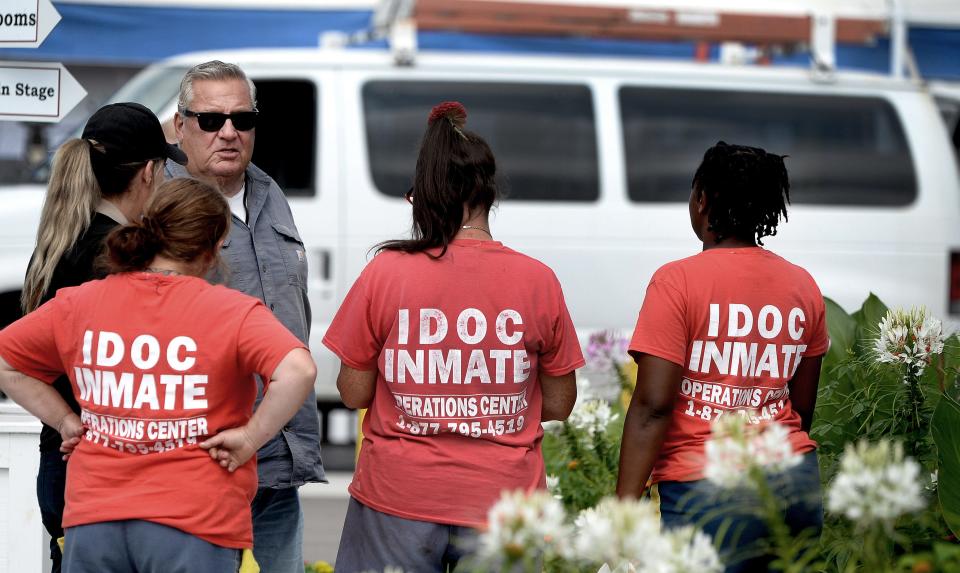Thousands of jobs, pennies on the dollar: How Illinois uses prison labor
For the small savings he built while working as an Illinois Department of Corrections inmate, Kensley Hawkins nearly lost it all.
In 2011, the department sued Hawkins for the $11,000 he made while working at a furniture-assembly job at a Joliet prison. The money would have gone to cover a portion of his incarceration costs if not for the Illinois Supreme Court ruling in his favor allowing him to keep what he had earned.
After 40 years spent in prison, his sentence for convicted murder was commuted in April 2021 by the Illinois Prison Review Board. In the 27 years he worked making chairs, tables, and desks for state entities, Hawkins estimates he earned about $20,000 -- working up to $1.50 per day in his final years behind bars.

While since increased, Hawkins' pay was the norm for skilled inmate workers in Illinois where advocates say wages and work conditions are insufficient.
"Working in industry, I think they should be paid at least minimum wage because it is a skilled job," Hawkins said in an interview with The State Journal-Register. "I feel like it would only be fair if we would be paid something reasonable."
Nationwide, pay for prison workers averages between 13 cents and 52 cents per hour according to a 2022 report from the American Civil Liberties Union. Some states do not pay.
ACLU Illinois director of communications and public policy Edwin Yohnka noted that many incarcerated do want to work often just to have something to do. Upgrades in pay, along with improved work and health conditions, however, are necessary.
More: Lacking establishment support, Bailey says grassroots congressional campaign will win
"As a country, we need to do better around all of these issues, and I just think we could start by doing better here in Illinois," he said.
'Slave labor'
According to data provided by IDOC, there are 27,400 incarcerated laborers working in the state. The work and pay vary by the individual. Some lay bricks, cook, or even tend to plants at the Illinois State Fair. The work can lead to reduced sentences.
IDOC issued a 10% raise last year retroactive to fiscal year 2022 which cost the department $6.4 million in fiscal year 2023. The current fiscal year appropriation for labor expenses is $6.5 million, which is less than 2% of IDOC's $337.3 million fiscal year 2024 budget.
The raises meant those who pick up trash on the side of the highways or skilled workers like Hawkins could earn $2.50 per day. Others that work in laundry services or as janitors could be paid as little as 85 cents for a day's work.
The pay incarcerated workers receive amounts to "slave labor," Vincent Boggan told The SJ-R earlier this month. Transferred to a host of correctional facilities during a nearly 33-year sentence for armed robbery, Boggan spent 20 years working as a prison law clerk before Gov. JB Pritzker commuted his sentence in December 2020.
Boggan earned $30 a month for most of his work in prison before finally making $45 per month in his last four years. He used his pay to purchase commissary goods, but also to cover medical co-pays that could eat up the pay he received for several days of work.
Out of prison, Boggan is employed as an administrative clerk with IDOC, handling many of the same obligations he had while incarcerated -- helping prisoners file clemency petitions or request transfers among them.
The critical difference is his pay: he earns more than $60,000 per year.
"The type of work we were doing was work that (IDOC) staff didn't have to do," he said.
Among the most coveted jobs for prisoners, Boggan said, was working with Illinois Correctional Industries -- an IDOC program offering jobs to inmates producing such goods as furniture, clothing, and cleaning products.
The products made by the incarcerated are no longer available for sale to private businesses or state agencies outside of IDOC due to a 2021 update to the ICI business model. Approximately 15% of ICI’s $33 million of sales in 2020 were made to groups outside of IDOC, The Effingham Daily News previously reported.
“This new model, which aligns programmatic efforts with a long-term vision focused on improving outcomes and increasing vocational and educational opportunities, means that ICI will no longer be selling its products and services to other agencies or organizations,” according to an update posted on the ICI website.
Possible changes
Before the latest raises, a trio of Democrat senators from Chicago co-sponsored a bill in 2021 that would have required at least minimum wage for IDOC or Illinois Department of Juvenile Justice inmates within ICI on work release or in a work training program.
Senate Bill 649 would have made Illinois one of the first states to set that standard but the bill never advanced out of committee before the 102nd General Assembly ended in January. Colorado pays some of its inmates the state's $13.65 minimum wage, but only those employed by private entities within a year of their release date.
Similar language has not been filed in the current General Assembly, but there could be resumed interest in the measure. Sen. Mike Simmons, D-Chicago, co-sponsored the earlier bill and has advocated for broader criminal justice reform, including granting the incarcerated the right to vote.

"There's this kind of inherited culture within our carceral system of, treating people poorly, and not respecting our basic human rights," he said Friday. "And I think in an advanced democracy like ours, that is a shame."
Renewed support on the matter could also come from Sen. Robert Peters, D-Chicago, who has twice introduced a prison minimum wage bill.
If each of the state's 27,400 incarcerated workers received the current $13 minimum wage, the expense for each hour would be a collective $356,200 for IDOC. In a 40-hour work week, that number grows to $14.3 million --more than two times the current amount the department spends per fiscal year.
Speaking with the non-profit news outlet Stateline, Peters noted the expense of this change but argued that incarcerated workers need wages that can cover essentials at the prison commissary. Outside of work, prisoners can also receive up to $5,000 in electronic payments from family members and friends to cover prison expenses.
“Yes, it’s expensive,” Peters said last year. “But we always find the money to build other things. Why are we not able to find the money for this? The challenge is: Why are there so many people in prison doing work that you can’t afford to pay them?”
Asked about the prison minimum wage issue, John Patterson, a spokesperson for Illinois Senate President Don Harmon said he was under the impression that work was ongoing with the bill.
Other states have responded to prison labor by putting measures on the ballot to end the use of forced labor -- an exception in the 13th Amendment allowing states to force work on the incarcerated. Voters in Alabama, Oregon, Tennessee, and Vermont decided to end that practice in November while a similar measure failed in Louisiana.
The loophole had made its way to many state constitutions but is not mentioned in the Illinois state constitution.
Contact Patrick Keck: (312) 549-9340, pkeck@gannett.com, twitter.com/@pkeckreporter.
This article originally appeared on State Journal-Register: Colorado pays minimum wage to some incarcerated workers. Could Illinois follow?

